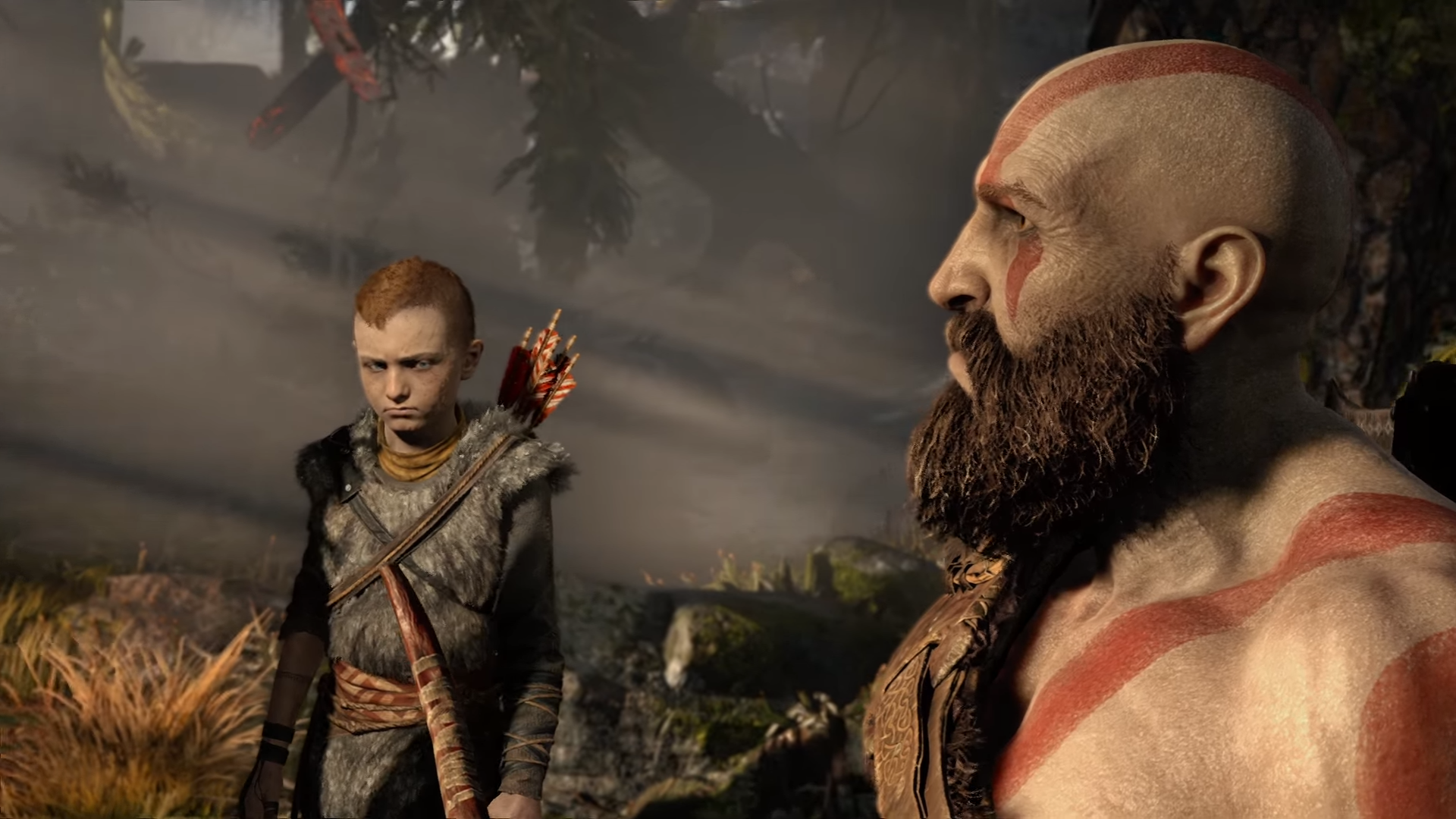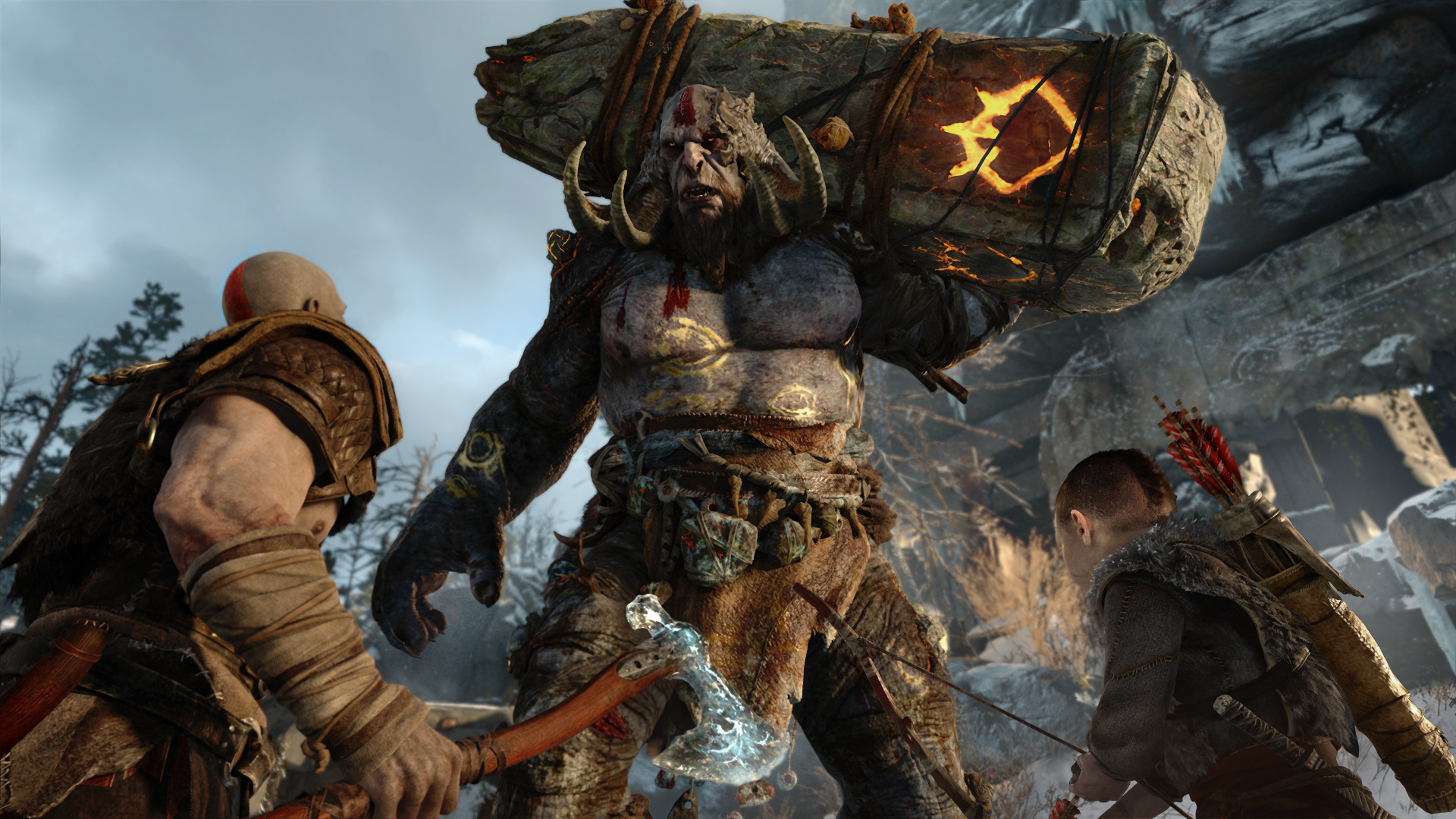God of War is a search for inner peace (with an axe), and shows how games are changing

The moment Kratos stepped into the light during PlayStation’s E3 reveal was one of the biggest outbreaks of ‘HOLY SHIT’ cheering of the night. I was lucky enough to be in the audience and his appearance had some people out of their chairs. However, while he’s back - and it is him, the same Kratos from the previous games, not a rebooted character - he’s a vastly changed man. And one with a son to raise in this brand new God of War.
This isn’t the ‘kill everything and shout at the bits’ Kratos we’ve seen before… No, wait it is, but he’s really trying to change. “Kratos has struggled with his rage and he blames his rage for a lot of his past mistakes” explains gameplay engineering lead Jeet Shroff during a behind closed doors demo. “Now he has a son, he’s a father [and] Kratos is struggling with this idea of trying to bottle down this rage and shield his son from what he has inside of him”.
What Kratos has been up to since the last game isn’t something Sony are talking about, but clearly it’s a time period that’s changed him. He still has the head-crushing madness inside but is trying to control it and be a better person. “It’s the same Kratos from before, carried forward into this game,” re-emphases technical designer Mihir Sheth. “The rage represents everything from Kratos’ past. The Kratos you know from previous games is bottled up in that rage. It’s something he finds difficult to manage because wants to keep it away [from his son]”.
It’s something shown in the demo when Kratos unleashes his ‘Spartan Rage’, a throwback to his time as a Greek god slayer (and not the only one we’re promised). Using it he punches a 15 foot troll into submission before calling on his son to kill it. From a gameplay point of view Shroff talks again about Kratos’ attempts to suppress his anger, saying “when is it a good time to unleash the monster out of the box?”
This highlights the two big changes to the series - combat and fatherhood. Let’s do the combat first because axe. Gone are Kratos’ sweeping blades and instead he now wields a magic axe, hacking via trigger-controlled light and heavy blows, and using a tighter, player-controlled camera. He can also hurl his new toy, switching to his fists to finish up enemies and recalling the weapon magically back to his hand to carry on hacking.

It’s a big change but an exciting one, swapping out the range of the old blades for a much more variable assortment of attack options, even at a basic level. Hacking, punching and throwing/recalling the axe already seems to have a satisfying flow and I suspect there’s more to come: the series has a history of different weapons and elemental modifiers; something Sony ‘aren’t talking about’ when I asked them.
During all the fists and axe work though, Kratos’ son is always there. “It’s a journey between you and your son,” states Sheth. “You play as Kratos but it’s a journey between both of you in the world”. Who the son is seems to be a secret. He’s not been named - he’s just called ‘Boy’ for now - and there was a lot of awkward laughter and ‘more details to come’ muttering when both Shroff and Sheth were asked specifically if the name would be revelatory in any way (Thor is the current favourite fan theory).
Sign up to the GamesRadar+ Newsletter
Weekly digests, tales from the communities you love, and more
Kratos’ relationship with his son is effectively a physical manifestation of his struggle to be a better person. For all the monster killing, action and visual showboating, this is the most telling moment of the demo for me:
Kratos’ stern tone towards ‘Boy’ isn’t out of unkindness, he’s struggling to prepare his son for the future using his limited repertoire of people skills, and that uncertain reaching out shows the conflict between murderous warrior and parent. “The game is Kratos trying to work out what it means to be a father,” says Shroff, “and teaching his son what it means to survive in this hostile environment”. It’s a two way road though: “on the flip side it’s also about the son teaching Kratos a little bit about what it means to human, and humanising Kratos. And as the journey goes on you’ll see us playing into that space”.
That last bit’s vital to making God of War work in a modern context. By the end of the last two PS3 games Kratos was basically a dick. On PS2 the cartoony looks excused a lot of what Kratos did. In later games it was harder to laugh off and by the time the Ghost of Sparta was jamming an innocent girl into a cog mechanism to solve a puzzle I found the character inexcusable.
That old Kratos had to go. A new game with the old character and tone would have been an uncomfortable experience and Mihir admits “it was a game for that time” when I asked him about it. There are plenty of smaller titles out there experimenting with emotional themes, but when gaming’s biggest poster boy for impotent male rage grows a heart and tries to be a better person it’s hard to ignore the changes in how games are starting to think about characters.
Kratos’ struggle with who he used to be is a literal metaphor for trying to move away from one dimensional characters that only serve gameplay. He’s still hacking the crap out of monsters, so that key part is still intact. However, it’s much harder to see Kratos fitting in a sex mini game while on dad duty. He’s grown as a character and hopefully so has gaming.

I'm GamesRadar's Managing Editor for guides, which means I run GamesRadar's guides and tips content. I also write reviews, previews and features, largely about horror, action adventure, FPS and open world games. I previously worked on Kotaku, and the Official PlayStation Magazine and website.


